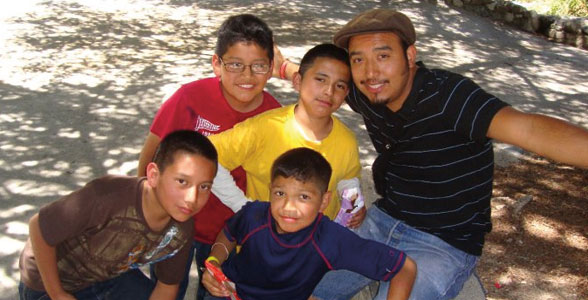By Diane Ballard
When Saundra Bryant went back to her roots, she went way back.
Bryant was a toddler—just 2 years old—when her parents brought her to daycare at All Peoples Christian Center in south central Los Angeles. The center was an oasis in the low-income neighborhood that was Bryant’s childhood home.
Something about the center, the people, the nurturing and support helped Bryant complete high school, earn a scholarship to Cal Poly Pomona, and attain a master’s in social work at UT Knoxville. And something about All Peoples drew her back.
“I’m going on 27 years,” says the now–executive director and licensed clinical social worker.
The educational detour to Tennessee was courtesy of her faculty adviser at Cal Poly, who knew a faculty member in UT’s School of Social Work. Together the professors helped Bryant line up a scholarship, financial aid, and work-study in Knoxville. She earned the master’s in social work administration and planning in 1979.
All Peoples, the community center she calls her second home, continues to serve people more hard hit than most by the economic downturn. The neighborhood is a densely populated low-income area 5 minutes from downtown LA, heavily Latino and, Bryant says matter of factly, home to 16 gangs. Last year the center experienced a 100-percent increase in families needing food. The waiting list to get children into the after-school program grew, and the state of California, because of its own severe financial difficulties, cut funding.
The center employs a staff of 27 and operates on a combination of government, foundation, and private dollars. Bryant is the chief fundraiser and decisionmaker.
“But I can’t be just an administrator,” she admits. “Sometimes I have to get up from my desk and walk around the building. I need to see the children.”
Bryant’s career is a pastiche of meaningful victories and regrettable losses. She treasures such memories as the delight of a severely nearsighted preschooler whom she helped to get glasses, but has learned outcomes aren’t always joyous. “Sometimes you do everything possible but still don’t see an impact, and you have to accept that.” She never quits trying, and her work has earned her awards aplenty. The most meaningful, she says, was her Durfee Foundation Fellowship, which funded a 3-month sabbatical in 2000. The private charitable Durfee Foundation supports education, arts, and community development in Los Angeles County. Bryant says even more valuable than the award is the network of contacts she enjoys as a result.
“It’s not like just getting an award, and that’s the end of it,” she says.
During her tenure at All Peoples, the budget has more than doubled, and the number of professional social workers has increased 65 percent. She has nurtured relationships with the public schools, the city, and the county to be able to provide more services to the center’s clients.
Bryant says running a nonprofit has become more and more challenging, not only because of the economy but also due to cumbersome regulations: “We’ve recently has six audits, and while I understand the reason, it takes time away from the other things we could be doing to help our community.”
Another challenge of regulatory oversight is the need to show annual progress. The expectation of turning a family’s life around in a year just isn’t realistic, she says. “It may be ten years before they realize the impact the center had.”
Maintaining the center’s services keeps Bryant true to her personal experience.
“I came to All Peoples at age two. My brothers and I were here while our parents worked. The people here cared about me. When I messed up, they would get on my case—but they cared.
“Working at All Peoples was my first job when I was fourteen, and I worked summers here when I was in college.” She says the staff helped make her the person she is.
“They opened the door and helped me walk through,” she says. Now she’s the one in a position to help. But she feels more than professional responsibility: “It’s not a job. It’s a calling.”

